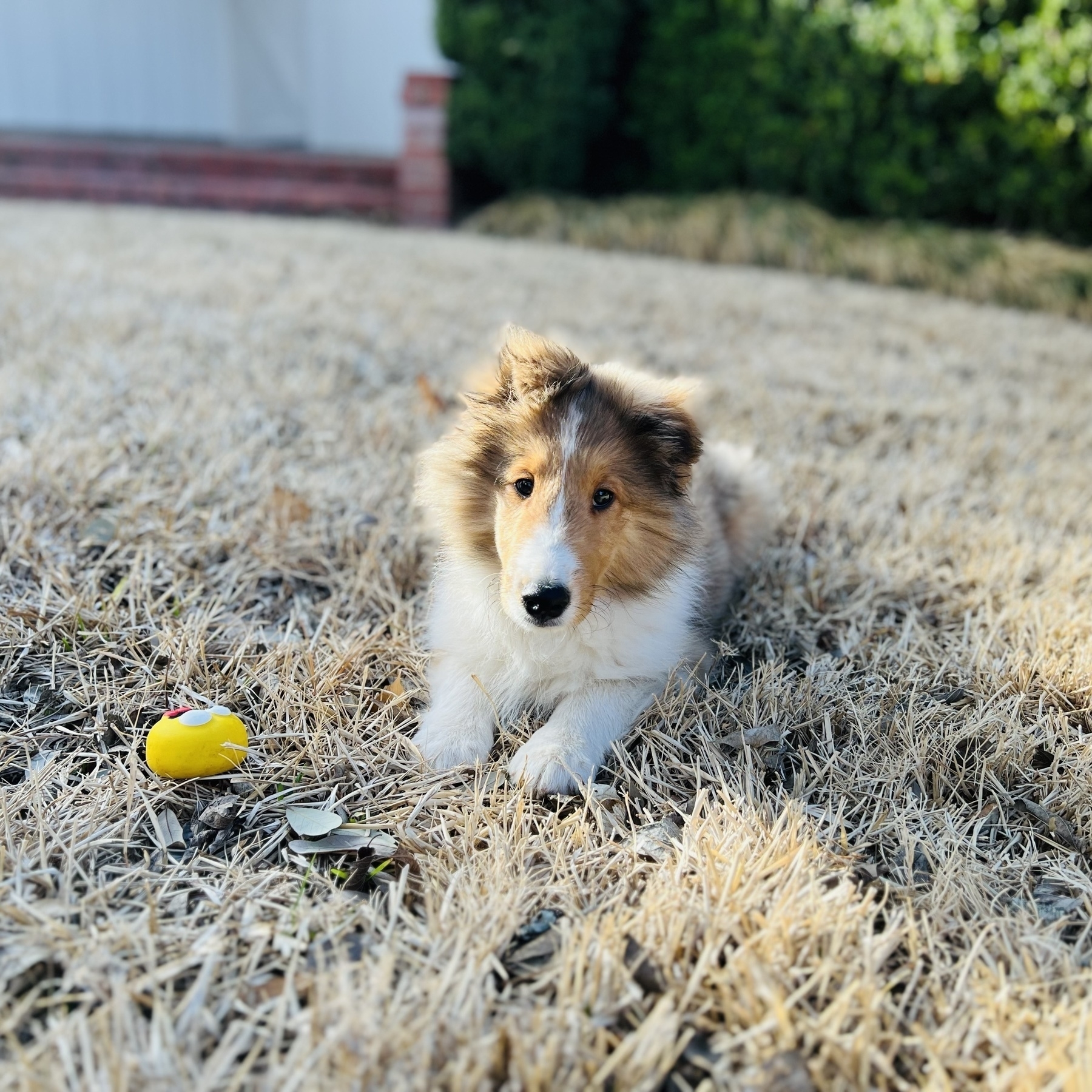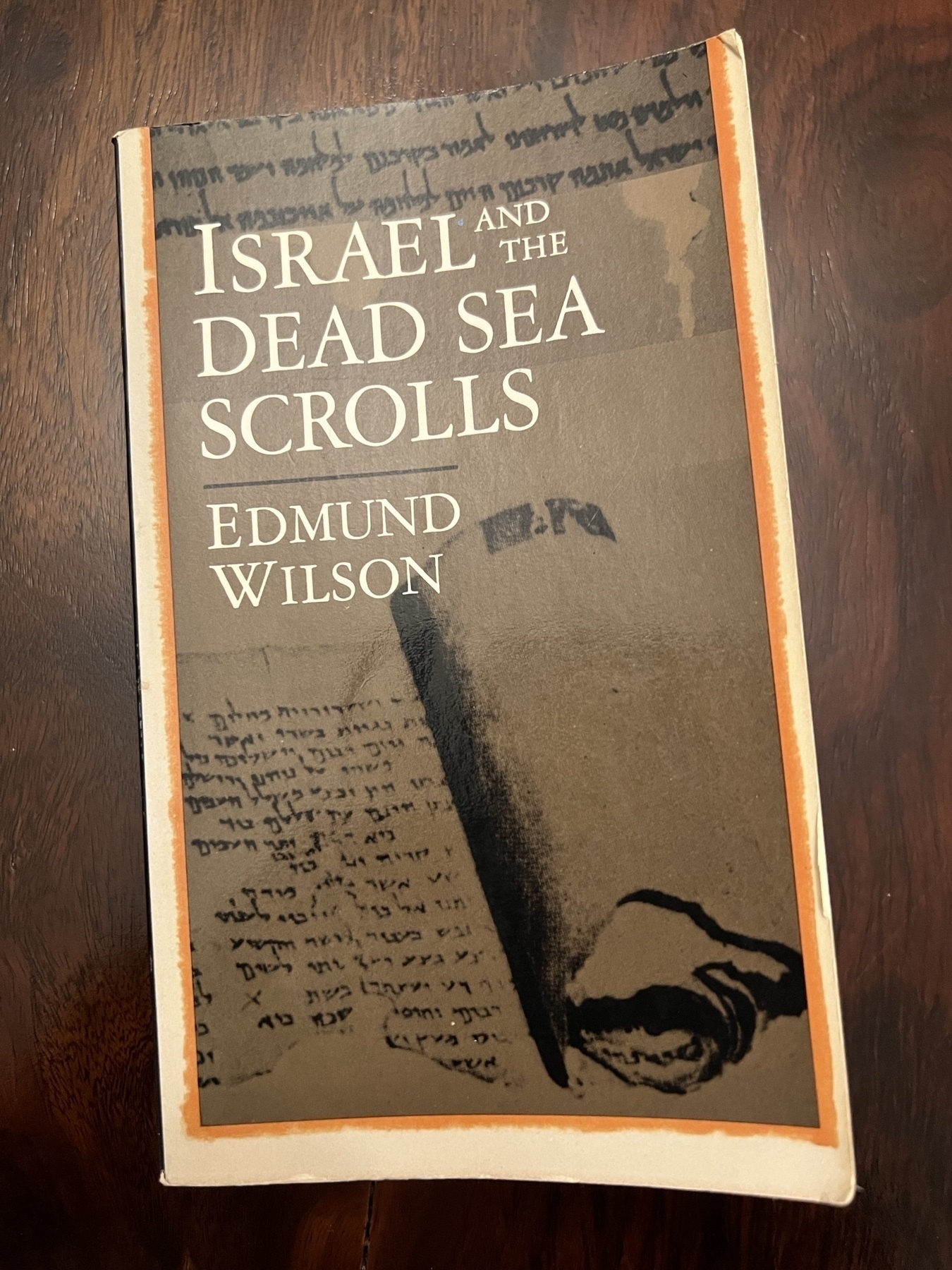trouble

I’ve got a few posts queued up, but I am expecting serious disruption in service next week — like, a Southwest-Airlines-over-the-holidays level of disruption — thanks to the creature pictured above. His name is Angus. My one quiet time of the day, in the early morning with my coffee and my RSS feed, is quiet no longer. It will take us all a while to adjust.
I’m just stating, not complaining. He is pretty darn adorable.

comping
I began to learn that instrumentalists and singers often didn’t want or need … validation from the accompanist. Actually, most of the time, they preferred that you supply your steady support by staying clear of their path, not answering their every idea, but rather laying something down more locked into the bass and drums, even grid-like. If you are constantly trying to interact with every idea they present, you are not really accompanying, properly speaking — you are hijacking their ideas in a sense, and putting the focus on what you’re doing instead. It becomes more, “Look at me everyone, I’m so hip and adept at catching the soloist/singer’s ideas!” But what it’s really saying to the soloist/singer (and the audience) is: “Please like me!” It’s overbearing. It feels like one of those people you know who, when in a conversation with you, is constantly affirming what you’re saying — “Yeah … totally … exactly!” — before you’ve even finished your thought.
Mehldau started thinking back to his teenage years when he worked in a pizza joint in West Hartford, Connecticut:
I remembered the guy Jeremy at Papa Gino’s who was flipping pies within a few short months while I struggled at the grill. He didn’t give a shit — it was 5:45 evening rush hour, the place was packed and customers were eyeing him impatiently. But he was as cool as a cucumber, getting the pizzas in and out of the big oven. Maybe the thing was to just not give a shit with comping as well — not to throw away your taste and sensibility, mind you, but to bring a little of that cavalier pie-flipping thing into it. I started watching this less sensitive kind of comping going on at jam sessions or on gigs, and I didn’t always dig it. But I also noticed that other people often did — most importantly, the soloists they were comping behind. So what did it matter what I thought?
What a great analogy.
“Comping” is a universal term in jazz. It probably derives from “accompaniment,” maybe also from “complement,” but it has a distinctive valence: the good comper is the musician who can support the soloist in meaningful ways without becoming a rival for the audience’s attention. The best comper improves and strengthens the audience’s response to the soloist without anyone ever noticing.
Albert Murray, whom I’ve been thinking about a lot — see this post, and I’ll have an essay on him in the next issue of Comment, which I will no doubt call your attention to when it appears — used to say that his role was to comp for other artists: his friend Ralph Ellison (who was a music major in college and played the trumpet) was a great soloist, but Murray’s job was so support that kind of high-flying virtuosity with an imaginative but also reliable groove.
I love this idea of critical and essayistic writing as a kind of comping for the artists and thinkers I admire and learn from. I’d like to think that my best work exhibits some of the virtues of the quiet, cool, comping jazz pianist.
… but he’s getting quite comfortable already.

Angus was a little nervous for the first few minutes here…

the ed-tech business model

NYT:
The misuse of A.I. tools will most likely not end, so some professors and universities said they planned to use detectors to root out that activity. The plagiarism detection service Turnitin said it would incorporate more features for identifying A.I., including ChatGPT, this year.
More than 6,000 teachers from Harvard University, Yale University, the University of Rhode Island and others have also signed up to use GPTZero, a program that promises to quickly detect A.I.-generated text, said Edward Tian, its creator and a senior at Princeton University.
As writers … long-form was never something we could get our heads around. It’s a different paradigm. Not to be shitty about it, but you can look at stories that they have a beginning, middle, and end. But so much of television has a beginning, a middle, a middle, a middle, a middle, until the whole thing dies of exhaustion.
He’s not wrong.
Giorgio Agamben, Idea of Prose:
Study, in effect, is per se interminable. Those who are acquainted with long hours spent roaming among books, when every fragment, every codex, every initial encountered seems to open a new path, immediately left aside at the next encounter, or who have experienced the labyrinthine allusiveness of that “law of good neighbors” whereby Warburg arranged his library, know that not only can study have no rightful end, but does not even desire one.
Here the etymology of the word studium becomes clear. It goes back to a st- or sp- root indicating a crash, the shock of impact. Studying and stupefying are in this sense akin: those who study are in the situation of people who have received a shock and are stupefied by what has struck them, unable to grasp it and at the same time powerless to leave hold. The scholar, that is, is always “stupid.” But if on the one hand he is astonished and absorbed, if study is thus essentially a suffering and an undergoing, the messianic legacy it contains drives him, on the other hand, incessantly toward closure. This festina lente, this shuttling between bewilderment and lucidity, discovery and loss, between agent and patient, is the rhythm of study.
peeved
This should not annoy me as much as it does, but … here’s a sentence that I see sometimes in books or articles: “I tried unsuccessfully to reach him by email.” I always think, What, you couldn’t find the send button? Or you didn’t know how to get an email account? Of course, that’s never what they mean. But what do they mean? It seems to me that there are two possibilities: either they couldn’t find an email address for the person, or they emailed the person and didn’t get a reply. So why not just say which of those it was?
Currently reading 📚

I don’t like inconveniencing others, and for many parents the possibility that one day they could be a burden on their children scares them much more than death. I think this is a noble sentiment, and would gladly sacrifice myself when I’m old so that those I care about can live better and more fulfilling lives. If we’re going to talk about human dignity, I could think of nothing less dignified than ending a proud and successful life in diapers and with your brain rotting away, making your children miserable and preventing them from reaching their full potential.Just want to flag the planted axioms (unstated governing assumptions) here:
- A “proud and successful life” is an independent life;
- Conversely, dependence on others is shameful;
- To care for a person who is dependent on you is only a source of misery.
What if human dignity isn’t to be found in being proudly independent, but in loving and being loved, in caring-for and being-cared-for?
Just posted an update for my Buy Me a Coffee supporters.
Liberalism cannot easily renew itself, because despite what certain of its detractors and some of its champions insist, it isn’t really a political-moral-theological system in full; rather, it’s a deliberately thinned-out structure designed to manage pluralism, which depends on constant infusions from other sources, preliberal or nonliberal, to generate meaning and energy and purpose. There are moments of transition and turmoil when liberalism appears to stand alone, and liberals sometimes confuse these moments for an aspirational norm. But nobody except Hugh Hefner, Gordon Gekko and a few devotees of the old A.C.L.U. can bear to live for very long under conditions of pure liberalism. Instead, the norm for successful societies and would-be society builders is liberalism-plus: liberalism plus nationalism (as in 19th-century Europe or Ukraine today), liberalism plus intense ethnic homogeneity (the Scandinavian model, now showing signs of strain), liberalism plus mainline Protestantism (the old American tradition), liberalism plus therapeutic spirituality (the mode of American culture since the 1970s), liberalism plus social justice progressivism (the mode of today’s cultural left), etc., etc. Something must be added, some ghost needs to inhabit the machine, or else society begins to resemble the portraits painted by liberalism’s enemies — a realm of atomized, unhappy consumers, creatures of self-interest whose time horizons for those interests are always a month rather than a decade, Lockean individuals moving in a miserable herd.
the Christian and the hearth
In traditional Roman culture, the focus, the hearth, is all about holding the family together: the family is the essential, immutable, and foundational unit of civilization. What the Romans called the dignitas marriage — as opposed to the concubinatus union, which was merely a formalizing of a sexual relationship. — was meant to ground all the larger elements of the social order. (The young Augustine, as he explains in his Confessions, had a concubinatus relationship while he was waiting for his parents to organize a dignitas marriage for him, and he and his concubine were alike heartbroken when told that their union had to be broken.) Thus the legal, and not just the social, dominance of the paterfamilias — his patria potestas.
As Carle Zimmerman shows in his seminal Family and Civilization, the Christian church, when it emerged as a force in Roman society, complicated the simple duality of the Roman system. Bishops and priests denounced the concubitanus marriage: legally, it had to be dignitas or nothing. But even dignitas marriage was insufficient, in that it was merely personal and social: true Christian marriage is sacramental, and an image of the relationship between Christ and his church. What the marital family was in secular legal terms came to matter less than what it was in the eyes of God — and the eyes of canon law. (As Zimmerman explains, when in the late-antique and early-medieval world political order grew more fractured and tenuous, this only intensified the power and authority of the Church over the family.) Thus was inaugurated the close connection between the family and the Church that persists in various ways even today.
There’s absolutely no question, as I have said many times on this blog and elsewhere, that if Western society is going to be restored and renewed, such restoration and renewal will need to begin in the family. Everything about our system of metaphysical capitalism is built around detaching people from both the comforts and the obligations of family. If you have sustained a healthy family in our current environment you have done something pretty special, and achieved it against heavy odds.
All that said, and I’m not taking any of it back, Christians really can’t have a straightforward relationship to family. We can’t simply be Romans, even Christianized Romans. There’s this countervailing force in Christian tradition and practice that has to be accounted for. Jesus says that unless you hate your own mother and father, you cannot be a follower of his (Luke 14:26). Jesus says that foxes have holes and birds have nests, but the Son of Man has nowhere to lay his head (Matt. 8:20). Jesus left his home and his family in order to proclaim the kingdom of God, and then to suffer and die; most if not all of his apostles did the same. Saul of Tarsus did not remain in Tarsus, nor did he even remain in Jerusalem, the place that he came to be educated. In the service of the Gospel, he traveled all over the Mediterranean, and died, we believe, in Rome. It was said of Christian missionaries back in the day that they went to the mission field carrying their coffins on their backs – that is, they planned never to return to what had been their home, but to live out their lives in strange lands, so that they could tell people about Jesus.
And of course Jesus never married; not did Paul, whose attitudes towards marriage were notoriously complex. “Husbands, love your wives, as Christ loved the church” (Eph. 5:25); but the celibate life is superior (I Cor. 7:7). Neither Jesus nor his last apostle were hearth-and-home types, it seems.
This is why I’ve always slightly hesitant about the project of the Front Porch Republic folks. What they are doing is admirable in so many ways, and yet I worry that they could inadvertently foster a kind of idolatry of place. However wonderful and essential home and family are for almost all of us, the Christian has to be willing to give both of those up in order to follow Jesus. We won’t necessarily be able to do that following in our home towns, though perhaps most Christians will be granted that privilege.
There is then something inevitably cosmopolitan about Christianity, not in the sense that the Christian is at home everywhere but in the sense that the Christian can’t be fully at home at home anywhere, given that our citizenship is not of this world (Phil. 3:20). Our primary loyalty must be to the City of God, and not to the City of Man.
I don’t know how to sort all of this out, but I do know that it makes the business of cultivating focal practices complicated for the Christian. What do the practices of the hearth have to do with the Christian life? And how can a Christian pursue focal practices if she doesn’t have a hearth to return to at the end of the day? No, the essential focal practices of the Christian will have to be something more, and maybe other, than the Roman ones. What are the necessary focal practices for a pilgrim people?
Thanks to [Lillian] Gilbreth, workers would be treated not as cogs in a machine, but as people. So great was her compassion for workers that she devoted much of her career to improving the work and home life of persons with disabilities, a population that had exploded as a result of World War I injuries. This required, for example, studying special challenges faced by the blind in performing routine tasks, developing curriculum for teachers of the blind, teaching the blind themselves, and finding opportunities for the employment of the blind in industry. Taylor might have branded such workers inherently inferior, but Gilbreth concentrated on enhancing their capabilities to contribute.
This concern for the worker as a human being instead of an economic tool expressed itself in many practical forms. With Frank, she improved lighting conditions for workers, thus reducing eye strain, and introduced regular breaks throughout the workday. She installed suggestion boxes in the workplace, so the voices of workers would be heard. She required employment contracts to be signed by representatives of both management and organized labor. And when she became the first woman engineering professor (1935) and later the first woman to be promoted to full professor at Purdue University (1940), she focused her considerable energy on opening up careers for women.
This is a fascinating essay — until reading it I knew nothing about Gilbreth, whereas I know a good bit about her demonic opposite, Frederick Winslow Taylor. That may say something about me, but it also says something about the culture of labor in this country over the past century.
Many are wailing that this technology spells “the end of high school English,” meaning those classes where you read some books and then write some pro forma essays that show you sort of read the books, or at least the Spark Notes, or at least took the time to go to Chegg or Course Hero and grab someone else’s essay, where you changed a few words to dodge the plagiarism detector, or that you hired someone to write the essay for you.
I sincerely hope that this is the end of the high school English courses that the lamentations are describing because these courses deserve to die, because we can do better than these courses if the actual objective of the courses is to help students learn to write.

Currently reading: The Secret Gospel of Mark by Geoffrey S. Smith and Brent C. Landau 📚
Currently listening: Emerson Quartet, Bach: The Art of Fugue ♫
